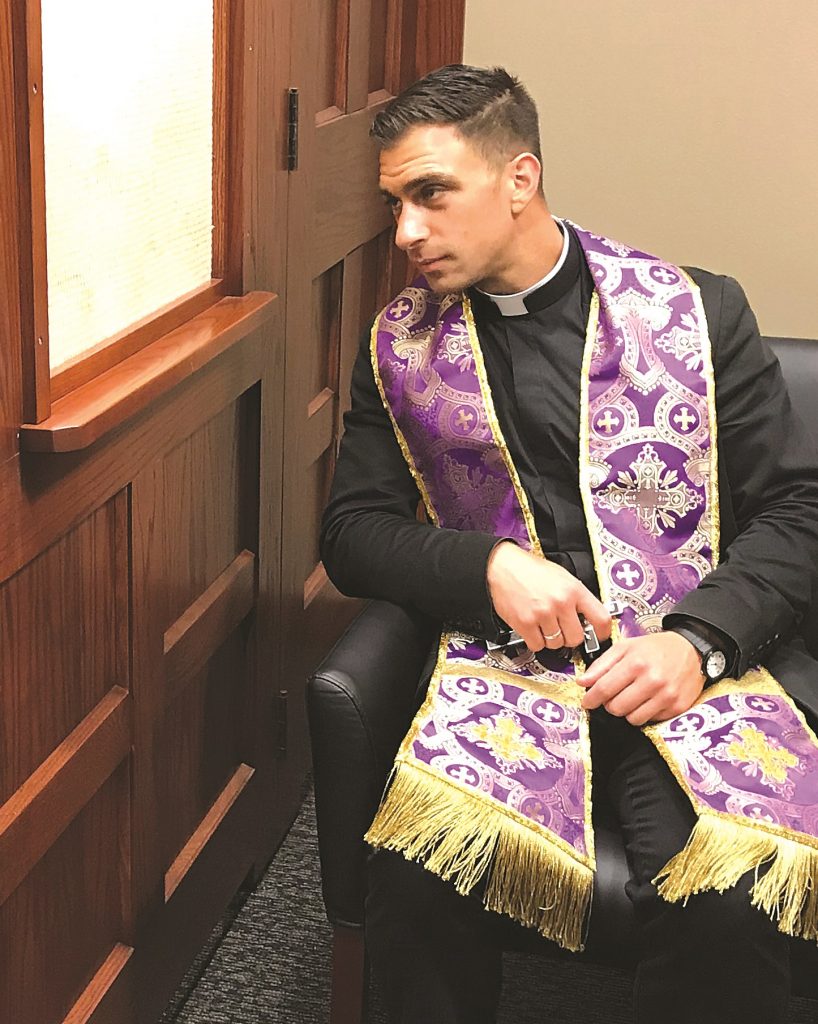
In celebration of our lives within the Christian Mystery, the Church has always provided Sacraments for the healing of body and soul. These include the Sacraments of Reconciliation and the Anointing of the Sick.
How to ask for the Sacrament
St. Mary’s in Moscow offers the Sacrament of Penance and Reconciliation from 8:00 a.m. – 9:00 a.m. each Saturday in the church. You may also call the office to make a personal appointment. The Sacrament can be ANONYMOUS (behind the screen) or FACE to FACE. If it has been some time since you have celebrated this Sacrament please call the office and make an appointment with the priest and discuss what you would like to do, or tell the priest in the Reconciliation Room that you require assistance in how to celebrate the sacrament and he will guide you through the process.
Sacramental Preparation for Children
St. Mary’s Parish offers families with children the opportunity to receive the sacraments of First Reconciliation (Confession) and First Holy Communion. Children are first prepared to receive the Sacrament of Reconciliation and then their preparation will continue for reception of First Holy Communion (the Eucharist.) Preparation for both Sacraments begins in the Fall each year and concludes with the celebration of First Communion in the Spring. The overall objective is to foster a deeper love of Christ that will allow these children to fully participate in the mass and receive the abundant graces our Lord wishes to bestow on those who come forward to receive Him at Communion.
Parish children who are entering the 2nd grade or already 7 years of age and validly baptized are required to participate in parish based sacramental preparation-this includes our home schooling families.
For more information on the programs for First Reconciliation and First Holy Communion please contact the Director of Religious Education at St. Mary’s (208-882-8001) or call the parish office at 208-882-4813. To register your child for First Sacraments Preparation, please fill out the Children-Youth Registration Form.
About the Sacrament of Penance and Reconciliation
... Read MoreThe Lord himself taught us to pray: “Forgive us our trespasses,” linking our desire of forgiveness to the forgiveness of our sins that God grants us in this Sacrament. Christ’s call to conversion and penance continues to resound in the lives of Christians. It is by faith that one renounces evil and gains salvation, that is, the forgiveness of all sins and the gift of new life.
The reception of this sacrament ought to be prepared for by an examination of conscience made in the light of the Word of God. The passages best suited to this can be found in the Ten Commandments, the Gospels, the Sermon on the Mount and the Beatitudes. When the priest celebrates the Sacrament of Penance with you, the priest is fulfilling the ministry of the Good Shepherd who seeks the lost sheep, of the Good Samaritan who binds up wounds, of the Father who awaits the prodigal son.
The sacrament of Penance consists of the penitent’s acts of confession, repentance and the intention to make reparation for sins.
After counsel from the priest the Penitent is asked to say the following or similar ACT OF CONTRITION:
My god,
I am sorry for my sins with all my heart.
in choosing to do wrong
and failing to do good,
I have sinned against you
whom I should love above all things.
I firmly intend, with your help,
to do penance,
to sin no more,
and to avoid whatever leads me to sin.
Our Savior Jesus Christ
suffered and died for us.
In his name, my God, have mercy.
Amen.
Following this is the priest’s absolution.
“God, the Father of mercies,
through the death and the resurrection of his Son
has reconciled the world to himself
and sent the Holy Spirit among us
for the forgiveness of sins;
through the ministry of the Church
may God give you pardon and peace,
and I absolve you from your sins
in the name of the Father, and of the Son and of the Holy Spirit.“
For more information on the Sacrament of Penance and Reconciliation see the Catechism of the Catholic Church. (paragraphs ¶1420-1498)
